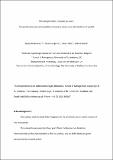Files in this item
The rich get richer, the poor get even : perceived socioeconomic position influences micro-social distributions of wealth
Item metadata
| dc.contributor.author | Bratanova, Boyka Antonova | |
| dc.contributor.author | Loughnan, Stephen | |
| dc.contributor.author | Klein, Olivier | |
| dc.contributor.author | Wood, Robert | |
| dc.date.accessioned | 2017-03-23T00:33:05Z | |
| dc.date.available | 2017-03-23T00:33:05Z | |
| dc.date.issued | 2016-06 | |
| dc.identifier | 241446007 | |
| dc.identifier | 8c50c94b-c6f8-4582-ba0b-bd7d5f1bcdee | |
| dc.identifier | 84964301188 | |
| dc.identifier | 000379940100008 | |
| dc.identifier.citation | Bratanova , B A , Loughnan , S , Klein , O & Wood , R 2016 , ' The rich get richer, the poor get even : perceived socioeconomic position influences micro-social distributions of wealth ' , Scandinavian Journal of Psychology , vol. 57 , no. 3 , pp. 243–249 . https://doi.org/10.1111/sjop.12281 | en |
| dc.identifier.issn | 0036-5564 | |
| dc.identifier.other | ORCID: /0000-0001-8247-0871/work/64361381 | |
| dc.identifier.uri | https://hdl.handle.net/10023/10508 | |
| dc.description.abstract | Economic inequality has a robust negative effect on a range of important societal outcomes, including health, wellbeing, and education. Yet, it remains insufficiently understood why, how, and by whom unequal systems tend to be perpetuated. In two studies we examine whether psychological mindsets adopted by the wealthy and the poor in their micro-social transactions act to perpetuate or challenge inequality. We hypothesized that occupying a wealthier socio-economic position promotes the pursuit of self-interest and contributes to inequality maintenance; poorer socio-economic position, on the other hand, should promote the pursuit of fairness and equality restoration. In Study 1, participants completed an Ultimatum Game as proposers after being primed to believe they are wealthier or poorer, offering money to either poor or wealthy responders. As expected, the wealthy pursued their self-interest and the net effect of this behavior contributes to the maintenance of inequality. Conversely, the poor pursued fairness and the net effect of this behavior challenges inequality. In Study 2, participants were responders deciding whether to accept or reject unfair distributions. Compared to the wealthier, the poorer challenged inequality by rejecting unequal offers. The links between micro-social processes and macro-societal inequality are discussed. | |
| dc.format.extent | 630413 | |
| dc.language.iso | eng | |
| dc.relation.ispartof | Scandinavian Journal of Psychology | en |
| dc.subject | Inequality | en |
| dc.subject | Class | en |
| dc.subject | Intergroup relations | en |
| dc.subject | Ultimatum game | en |
| dc.subject | HB Economic Theory | en |
| dc.subject | SDG 10 - Reduced Inequalities | en |
| dc.subject.lcc | HB | en |
| dc.title | The rich get richer, the poor get even : perceived socioeconomic position influences micro-social distributions of wealth | en |
| dc.type | Journal article | en |
| dc.contributor.institution | University of St Andrews. Centre for Research into Equality, Diversity & Inclusion | en |
| dc.contributor.institution | University of St Andrews. School of Management | en |
| dc.identifier.doi | https://doi.org/10.1111/sjop.12281 | |
| dc.description.status | Peer reviewed | en |
| dc.date.embargoedUntil | 2017-03-22 |
This item appears in the following Collection(s)
Items in the St Andrews Research Repository are protected by copyright, with all rights reserved, unless otherwise indicated.

